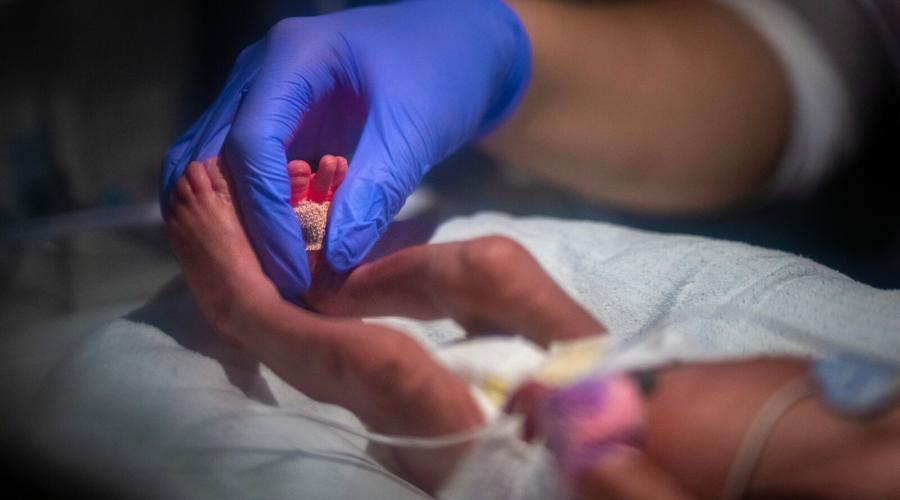
UCSF Research Could Prevent a Devastating Lung Complication in Vulnerable Infants
For many families of children born with certain heart defects or born prematurely, the journey doesn't end with navigating the initial diagnosis. These newborns face a significant long-term risk of developing pulmonary arterial hypertension (PAH), a life-threatening condition of high blood pressure in the lungs for which current preventative treatments are often ineffective.
Now, new research led by the Department of Pediatrics at UC San Francisco provides a deeper understanding of how this devastating disease begins and offers hope for a new therapeutic strategy to stop it in its tracks.
Uncovering a Harmful Chain Reaction in the Lungs
A central mystery in pulmonary hypertension research has been understanding how the physical stress of abnormal blood flow and pressure in the lungs triggers damage at a cellular level. In a new study published in Scientific Reports, a team led by Jason Boehme, MD, associate professor in UCSF’s Division of Pediatric Critical Care, has pinpointed a key series of harmful reactions.
They found that the constant stretch from high pressure overloads the cells' mitochondria, causing them to produce an excess of damaging molecules called reactive oxygen species (ROS).
This flood of ROS, in turn, activates a protein called HIF-1α. Boehme explains that this is a crucial discovery because HIF-1α, typically associated with advanced, irreversible PAH, is now shown to be active in the very earliest stages of the disease. He says the finding “establishes a strong phenotypic connection and biologic throughline from early to advanced disease states," providing a potential target for new therapies.
A New Therapy Shows Success in the Lab
With a clear target, the research team tested a specially designed, mitochondrial-targeted antioxidant called MitoQ. Unlike a general antioxidant, MitoQ is engineered to go directly to the source of the problem — the stressed mitochondria.
The therapy succeeded on two critical fronts in their preclinical model: it improved the immediate function of the blood vessels, a key feature of early disease, and it also reduced the activation of HIF-1α, a marker of more advanced disease. “We hope that these discoveries bring us closer to interrupting disease progression by treating the pathways that link early and advanced pulmonary vascular disease,” says Boehme.
The Path Forward: From Discovery to New Medicine
The research team is now working with the UCSF Initiative for Pediatric Drug and Device Development (IPD3), co-founded by Emin Maltepe, MD, PhD, and Jeff Fineman, MD, of the Department of Pediatrics, and Janel Long-Boyle, PharmD, PhD, of the School of Pharmacy, to develop MitoQ as a preventative therapeutic for at-risk infants.
IPD3 helps pediatric researchers overcome the challenges, often leading to a translational bottleneck, that come with developing novel, safe, and effective therapies for newborns.
At the same time, the team is also looking "upstream" to better understand how the mechanical forces are first sensed by the cells. “HIF-1α is an important transcription factor in PAH, but it is also vital for the normal development of the lung and pulmonary vessels,” Boehme explains. “We’re now looking to identify pathways and therapeutic targets specific to the disease-related activation of HIF-1α while minimizing impacts on its normal functions in development.”
A Collaborative Effort Brings New Hope
Boehme emphasizes that this work was only possible due to the collaborative efforts of investigators in UCSF’s Pulmonary Vascular Biology Research Group, including Fineman, Maltepe, Sanjeev Datar, MD, PhD, and Michael Smith, MD – all members of the Department of Pediatrics.
By identifying a key driver of pulmonary hypertension and a promising therapy to interrupt it, their work brings new hope to the families of infants affected by heart defects or premature birth, offering the potential to prevent this devastating complication before it develops into a life-threatening issue.
Authors: Boehme, Datar, Smith, Maltepe, Fineman, and Wenhui Gong, PhD, of the UCSF Department of Pediatrics; Xutong Sun, PhD, Qing Lu, MD, PhD, Jamie Soto, Alejandro E Garcia-Flores, PhD, Gary W Raff, MD, Ting Wang, PhD, and Stephen M Black, PhD, of Florida International University.
